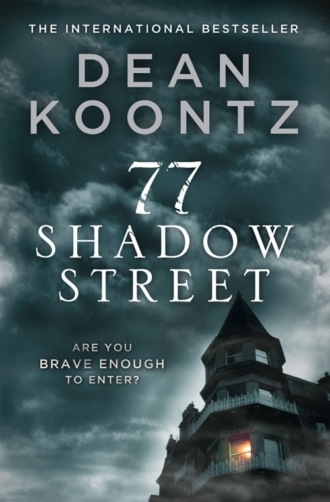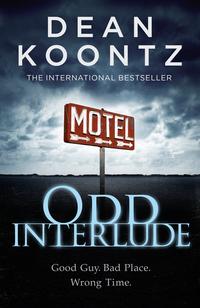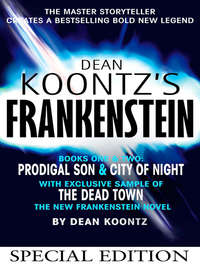
Полная версия
77 Shadow Street
In the hallway, Kinsley walked past the open door, toward the kitchen. He didn’t glance this way. Witness waited for the attorney to reappear, belatedly alerted by peripheral vision, but domestic noises in the kitchen suggested that no confrontation was imminent.
How would he react to finding a stranger—a strong young man in boots, jeans, and sweater—in his apartment as if by magic? With the fear of an old man weakened by time or with the calm authority of a lawyer still confident after decades of courtroom triumphs? Witness suspected that this was a man whose composure wasn’t easily shaken.
Two walls of the room featured floor-to-ceiling shelves packed full of books. Most of them were books of laws, of cases that were significant for the interpretations of laws that set precedents, and thick biographies of important figures in the history of American jurisprudence.
With reverence, Witness slid one hand lightly across the spines of those books. Where he came from, there were no laws, no attorneys, no judges, no juries, no trials. The innocent had been swept away by a brutal tide of belief in the primacy of the primitive, by faith in the wrong things, by rebellion against reality and the elevation of idiot conviction to the status of the single Truth. He had killed many people in his time, certain that he would never be held to account for the blood he spilled. Nevertheless, he held the law in high regard, just as a man who lived in godless despair might esteem the idea of God that he was unable to embrace.
Chapter 7
Apartment 2–A
The storm was a gift. The lyrics of “One Rainy Night in Memphis” needed a melody with bounce but also with a melancholy edge, which was not an easy combination to achieve, especially for Twyla Trahern. The bounce part gave her no difficulty, but melancholy was for her a secondhand experience, something that happened to other people, and though she had written a few melancholy songs before, she needed a moody environment to inspire her. With her guitar, she sat on a stool by a window in the study of her apartment on the second floor of the Pendleton, gazing at the timely rain, at the city lights twinkling in the premature twilight that the thunderheads impressed upon the day, picking out notes and trying various chords, seeking the sound of sorrow.
Although she didn’t always compose this way, she got the chorus first, because that was where the bounce needed to be most emphatic. She worked on it—the final refinements would be made at the piano—leaving the eight-bar bridge for later, which she would write after she had extrapolated the clean lines of the melody from the refrain.
As usual, she had earlier laid down the lyrics line by line, verse by verse, polishing each until it had a shine but not so much that it was slick. Shine without slickness was a hard standard to meet. Many lyricists could spring all the way through a song, knowing that a few lines weren’t good enough, that they would have to go back later to rewrite, but Twyla could not work that way. Sometimes, to get the syncopations correct, to make the syllables fall gracefully with the music, she would have to tweak the words once she completed the melody, but tweaking always proved to be the extent of it.
She wrote country and she was country, the daughter of a farmer who lost his farm in the recession of 1980, when she was two years old. He worked thereafter as a maintenance mechanic in a coal-fired power plant, mostly in windowless chambers where the heat could reach 130 degrees. Ten hours a day, five and sometimes six days a week. Sweating continuously. Often doing dangerous work in air smoky with the fine ash of pulverized coal that was flash-burned in a continuous controlled explosion. Winston Trahern endured his job for twenty-two years, to keep his family clothed and fed and comfortable. Twyla never heard her dad complain, and he always showered at the plant, after his shift, and came home looking fresh and clean. When Twyla was twenty-four, a coal cracker at the plant exploded, killing her father and two other men.
She had gotten from him the sunny disposition that made it hard work to write a melancholy song, which was a better inheritance than a pot of money would have been.
As flags of rain unfurled across the city and rippled down the window glass, the melody coalesced around the lyrics. Twyla began to realize she was writing a song that nobody could sing better than Farrel Barnett, her former husband. His first big hit as a performer and her first top-ten tune as a songwriter was “Leaving Late and Low,” and they were married as she finished writing four songs for his second CD.
At the time, she thought she loved Farrel. Maybe she did. Eventually, she realized that in part she had been drawn to him because his eyes were the same shade of blue as her daddy’s and because he had about him an air of trustworthiness and unshakable good cheer reminiscent of Win Trahern.
In Farrel’s case, the cheerfulness was real, though sometimes manic and sometimes inappropriate to the moment. But the trustworthy air was a projection as ephemeral as the beam of light that paints pictures on a movie screen. He went through women like a tornado through a Kansas town, tearing apart other marriages and stripping his more vulnerable lovers of their sense of self-worth as if he took pleasure not in the sex but instead in the destruction that he left behind. Although he always treated Twyla tenderly, he was not as respectful of other women. On a few occasions, one of these wretched specimens, rinsed through with bitterness, washed up on Twyla’s doorstep, as though having endured Farrel Barnett made them sisters in suffering who could console each other and plan a mutual vengeance.
After four years, she had no longer loved him. She had needed two more years before she realized that if she didn’t divorce him, he would blow apart her life and scatter the wreckage so widely that she wouldn’t be able to put herself together as she’d once been. By then, Farrel had made the country-music charts with fifteen songs, twelve written by Twyla, eight of which reached number one.
More important, they created a child together—Winston, named for Twyla’s father—and Twyla was at first determined that Winny would not be raised in a home without a dad. Eventually she came to understand that in some rare cases, a broken home might be better for a boy than one in which his narcissistic old man showed up only occasionally and then merely to recuperate from touring and from marathon adultery, less engaged with his young son than with his little entourage of sycophantic buddies.
Although she didn’t love Farrel anymore, didn’t even like him much, she didn’t hate him, either. When she finished “One Rainy Night in Memphis,” she would offer it to Farrel first because he would do the best job with it. Her songs supported her aging mother. They were Winny’s future. What was best for a song trumped settling old scores.
When the rumble rose not from the storm-torn heavens but from the ground under the building, Twyla’s fingers froze on the frets and raised the plectrum from the strings. As the last chord faded, she felt tremors pass through the Pendleton. Her Grammy and Country Music Association awards rattled on the glass shelves in the display case behind her piano.
In expectation of some impending disaster, she was still gazing through the tall window when barbed lashes of lightning flailed the sky, several great flashes that made the rain appear to descend haltingly, that flared as if with apocalyptic power and seemed to obliterate the other buildings flanking Shadow Street. As the tremors rising from the ground passed and as hard thunderclaps shook the afternoon, the lightning and rain conspired for a moment to make the four lanes of pavement seem to disappear. The city streets below vanished, the buildings and their lights. In the flickering celestial display there appeared to be nothing but a vast, empty landscape, the long hill and a terrible plain below it, something like a sea of tall grass stippled with clusters of black trees, their craggy limbs clawing at the gloom.
This vision must have been a trick of storm light on rain-washed glass, nothing more, because when the pyrotechnics stopped, the city was there as before, the buildings and the parks. The busy traffic ascended and descended the long boulevard, the blacktop streaming with rain and with glimmering reflections of headlights, with slithering red rivulets of taillights.
Twyla discovered that she’d gotten off the stool and had lowered her guitar to the carpet without being aware of either action. She stood at the window. What she had seen could have been nothing but an optical illusion. Yet her mouth went dry as she waited for another volley of lightning. In the next barrage, the city did not disappear, but held its ground. The unpopulated vastness, glimpsed before, did not reappear. A mirage. An illusion.
She turned to look past the piano at the display case. None of the awards had fallen over, but the shuddering of the building had been real, not a trick of light and rain-blurred window.
Chapter 8
Apartment 2–C
Bailey turned on all the lamps and ceiling fixtures in the living room, dining room, kitchen, master bedroom, guest bedroom, and both baths. He left them blazing even when he found no one lurking anywhere in the apartment. He wasn’t frightened by what he had seen. More curious than anything. The brighter the light in the place, the likelier he was to get a better look at whatever—if anything—came next.
He wasted no time considering the possibility that he might have hallucinated the entity in the swimming pool and the phantom that passed through a wall. He didn’t do drugs. He didn’t drink to excess. If he suffered from a brain tumor or another mortal condition, there had been no previous indication. In his experience, post-traumatic stress disorder, caused by the horrors of the battlefield, was chiefly the invention of psychiatrists bent upon stigmatizing the military.
In the bedroom, he retrieved a pistol from the bottom drawer in his nightstand. The Beretta 9 mm featured a twenty-round magazine, a six-inch Mag-na-ported Jarvis barrel, and Trijicon night sights. He had purchased the weapon after returning to civilian life, and he never had occasion to use it except on the shooting range.
Once armed, he didn’t know what to do next. If the things that he had seen were not full-blown supernatural apparitions, they were at least paranormal. In either case, a pistol might not be of any use. He intended to keep the gun handy, anyway.
He stood by the bed, holding the weapon, feeling frustrated and somewhat foolish. In war, he never had a problem identifying his enemies. They were the guys who wanted him dead, who were shooting at him and his men. They might run away when their surprise attack failed to gain them a quick triumph, but they didn’t simply vanish. To survive a firefight, to win it, marines had to do more than persevere; they had to be strategists and tacticians, which required a solid grasp of reality, a capacity for clear reasoning. Now here he stood with the Beretta, waiting for an enemy to materialize out of the wall, for an apparition, a boogeyman, a manifestation of unreason, as if he were not a marine and never had been, as if he were instead a character from the movie Ghostbusters.
As in the pool room eleven hours earlier, a rumble rose from the ground under the Pendleton. This time it escalated rapidly, became louder than before, and the building shuddered for perhaps five or six seconds before both the sound and the tremors faded. He had no doubt that this apparently seismic event was somehow related to the mysterious swimmer and to the inky specter that passed cat-quick through his study. Techniques of financial analysis, no less than battlefield experience, had taught him that coincidences were rare and that unseen connections were everywhere waiting to be uncovered.
No sooner had the Pendleton become still and quiet than Bailey heard the voice. Low and portentous, it sounded like a newscaster reporting disaster on a radio in another room, the shape of the words distorted, their meaning elusive—except that this voice was here, as intimate as a lover’s murmurs.
When he bent to listen to the clock radio on the nightstand, the voice seemed to come from across the room. He went to the armoire that housed the television, opened the doors to reveal the dead dark screen—and heard the speaker now behind him, seemingly close and yet still unintelligible.
Wherever he went in the bedroom, the unseen speaker spoke in a corner different from the one to which he had been drawn, as though taunting him.
When Bailey stepped into the adjacent bathroom, the voice was there as surely as it had been in the previous room. It seemed to issue from behind a mirror, but then from out of an air-intake grill near the ceiling, and then from behind the textured plaster of the ceiling itself.
As Bailey proceeded through the bright rooms, pistol held down at his side with the muzzle toward the floor, the voice grew darker, more menacing. The direction of origin changed even more rapidly, as though the speaker were a crazed ventriloquist succumbing to the fear that, of he and his dummy, only the puppet was real.
And then in the kitchen, the words became clearer, more fully formed, but no more intelligible. Bailey realized he was listening to a foreign language. Neither French nor Italian, nor Spanish. Not German. Not Russian. Nothing Slavic. Nothing Asian. He had never heard anything like it before, which perhaps should have made it seem like one of those extraterrestrial languages in science-fiction movies. Instead he thought it sounded ancient and primitive, though he didn’t know why he felt that way about it.
Not once did he suspect that the voice came from the apartment next door. The Pendleton was a steel-reinforced, poured-in-place concrete structure, and the renovators employed that same technique to separate condominium units from one another, augmenting it with modern sound-suppression technology. The only neighbor with whom he shared a wall on this floor was Twyla Trahern, the songwriter, and he couldn’t hear even the faintest chords of her piano when she was composing.
Standing by the kitchen island, turning in place, he listened to the voice issue from the air all around him, at first louder but then fading as if someone somewhere was turning down a volume knob.
As the voice became less than a muttered curse, the wall phone rang, and he picked it up. “Hello?”
“Bailey, dear, Edna and I need your calming influence.” Martha Cupp, one of the elderly sisters who were among his clients in the Pendleton, spoke with a firmness that was not imperious but rather like that of a good schoolteacher who set high standards and, with affection, expected you to meet them always. “Sally is either off her nut or on the whiskey.” Sally Hollander was their housekeeper. “She says she’s seen Satan in the butler’s pantry, and she wants to quit her job. You know how we depend on Sally.”
“I’ll be there as quick as I can. Give me five minutes,” Bailey said.
“Dear boy, you are the son I never had.”
“You had a son.”
“But he’s nothing like you, I’m sorry to say. His failing chain of sushi restaurants will soon be as dead as the fish they serve. Now he wants me to back him in a wind farm, four thousand windmills on some dreary plain in Nevada, producing enough energy to power eleven houses while killing six thousand birds a day. The boy is a huge wind farm himself, he chatters faster than a carnival barker. Please hurry and talk some sense into our Sally.”
As Bailey racked the wall phone, he suspected that Sally’s encounter with the devil himself would turn out to have nothing to do with whiskey.
“What’s happening here?” he asked aloud, and waited only a moment for the disembodied voice to answer him in that unknown language. The kitchen was now as silent as it was bright.
One
I am the One, the all and the only. I live in the Pendleton as surely as I live everywhere. I am the Pendleton’s history and its destiny. The building is my place of conception, my monument, my killing ground.
In celebration of my triumph, I prepare this file to be conveyed to you of great faith, to you who knew the world had gone wrong and longed to repair it. The world you have known is destroyed. I will show you …
Andrew North Pendleton, proud and ignorant, built his great house on this site not because the vista pleased him, but because of the legend of Shadow Hill. Like some others in the upper class in the late nineteenth century, Andrew was eager to pursue new ways of thinking, to throw off the chains of tired tradition. He became fascinated with various forms of spiritualism, and he had the leisure time to pursue them. Séances, sessions of automatic writing, crystal readings, past-life regression through hypnosis: He was a seeker, no less a fool than other men. An Indian mystic, of what tribe was never clear, told him the history of Shadow Hill, and Pendleton declared that he must build there to benefit from the spiritual energy of that hallowed ground.
Indians once settled atop the hill because at certain times of the year, a pale-blue light rose sporadically from old volcanic fumaroles, shimmering and dancing in the air. Infrequently, loved ones long dead appeared briefly among the living, as if the past and the present were one. The ground must be sacred, so they said, and the tribe would be protected by both the ghosts of those lost and by the shining blue spirits.
The mystic, secretly an agent for the owner of the land, failed to tell Andrew Pendleton that the Native Americans eventually moved off the hill when they experienced a more vivid spectacle that filled the night—and their encampment—with a seeming horde of bright-blue spirits less benign than those that had come before them.
On that night, half the tribesmen disappeared forever. They came to me. I partook of them, for they were an affront to my existence.
When Andrew Pendleton, his wife, and his children were presented to me, I allowed him alone to live. In a sense, I owed my existence to him, because he chose to build on Shadow Hill. His Belle Vista became not merely a house but also a vehicle that brought me into the world.
I am the One, and there can be no other. They come to me, and I receive them as the meat they are. In time, all will come to me, and then what must be will be. Thereafter only I shall know the sun and the moon.
Soon the current residents of the Pendleton will appear before me, bewildered by my many manifestations. I know them, for I know everything. Not all will perish, but nearly all. I especially desire the children; I do not tolerate innocence, and I despise gentleness. The ex-marine will discover that the concepts of honor and responsibility are not rewarded under my dominion.
Those who might love one another will not be saved by love. The only love that matters is self-love, and the only self worth loving is the One.
Конец ознакомительного фрагмента.
Текст предоставлен ООО «ЛитРес».
Прочитайте эту книгу целиком, купив полную легальную версию на ЛитРес.
Безопасно оплатить книгу можно банковской картой Visa, MasterCard, Maestro, со счета мобильного телефона, с платежного терминала, в салоне МТС или Связной, через PayPal, WebMoney, Яндекс.Деньги, QIWI Кошелек, бонусными картами или другим удобным Вам способом.







